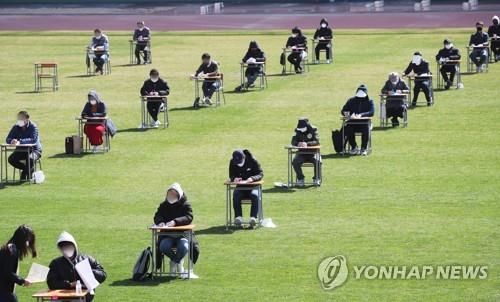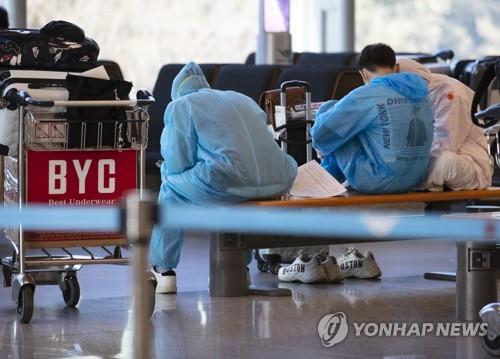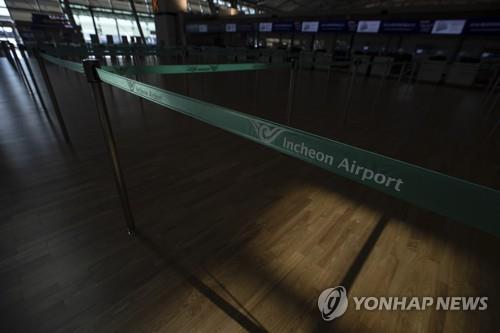- California Assembly OKs highest minimum wage in nation
- S. Korea unveils first graphic cigarette warnings
- US joins with South Korea, Japan in bid to deter North Korea
- LPGA golfer Chun In-gee finally back in action
- S. Korea won’t be top seed in final World Cup qualification round
- US men’s soccer misses 2nd straight Olympics
- US back on track in qualifying with 4-0 win over Guatemala
- High-intensity workout injuries spawn cottage industry
- CDC expands range of Zika mosquitoes into parts of Northeast
- Who knew? ‘The Walking Dead’ is helping families connect
New virus infections fall below 50 for 1st time since late February
South Korea recorded fewer than 50 new cases of the novel coronavirus Monday, marking the lowest number since late February, as the nation extended strict guidelines on social distancing.
South Korea has recorded around 100 or fewer daily new cases for more than three weeks, but health authorities remain on high alert over cluster infections at churches and hospitals, as well as new cases coming from overseas.
The 47 new cases, detected Sunday and down from 81 new cases a day earlier, brought the nation’s total infections to 10,284.
The nation’s death toll from the coronavirus, which emerged in China late last year, rose by three to 186. More than 130 recovered from the virus Sunday, raising the total number of cured people to 6,598, according to the Korea Centers for Disease Control and Prevention (KCDC).



More than 100 job applicants, seated at a safe distance from one another, take a written exam as part of the recruitment process at the city-run Ansan Urban Corp. at a football stadium in Ansan, about 40 kilometers south of Seoul, on April 4, 2020. The urban planning firm decided to hold the test outdoors to prevent the spread of the coronavirus. (Yonhap)
Vice Health Minister Kim Ganglip cautioned against reading too much into Sunday’s decline in daily infections, saying that fewer tests over the weekend meant fewer cases were detected.
About 10,000 daily tests were conducted on weekdays, compared with some 6,000 tests over the weekend.
The exact scale of the coronavirus pandemic is unknown because the virus can go undetected among people with no or mild symptoms. Simply put, the virus can spread when people gather.
Kim said social distancing is the best containment measure to slow the spread of the virus, calling for people to continue maintaining a distance from one another.
“In the end, the success of slowing the virus depends on people,” Kim told reporters.
There has been a controversy about whether people can be reinfected with the virus, although other coronavirus strains gave people immunity weeks or months after infection.
KCDC Director-General Jeong Eun-kyeong told reporters that a total of 51 people who declared cured tested positive for the virus again.
Jeong said there might have been a “reactivation” of the virus among the people, not “reinfection,” because they tested positive soon after they were released from isolation facilities.
The KCDC will send experts to Daegu, where 18 cured people tested positive again, for an epidemiological investigation, Jeong said.
Daegu and North Gyeongsang Province, the nation’s two worst-affected regions, reported 13 and two new cases, respectively, the KCDC said. The total number of cases reported in Daegu and the surrounding North Gyeongsang Province reached 6,781 and 1,316, respectively.
Other major provinces and cities also reported infections, with Seoul and the surrounding Gyeonggi Province adding 11 and eight new cases, respectively. Incheon, a port city located just west of Seoul, reported one additional case.
The country also detected seven new cases coming from overseas at border checkpoints, raising the country’s total number of imported cases to 769.
Seeking to reduce the daily number of new infections to below 50, South Korea has extended strict guidelines on social distancing to April 19. South Korea has tested 466,804 people so far.
Prime Minister Chung Sye-kyun emphasized the importance of keeping at safe distances and urged public cooperation, saying that it is the key to winning the “war” against COVID-19.
“Things have improved slightly over the past 15 days thanks to strict social distancing. That has had an effect, but since we need to keep our guard up, we have extended it by two more weeks,” Chung said, while visiting a major retail company in Seoul.
“People, small merchants and businesses are going through inconvenience but it is much better to prevent a disease than to get infected and be treated for it,” he added. “Social distancing is the way to win the war against COVID-19.”











